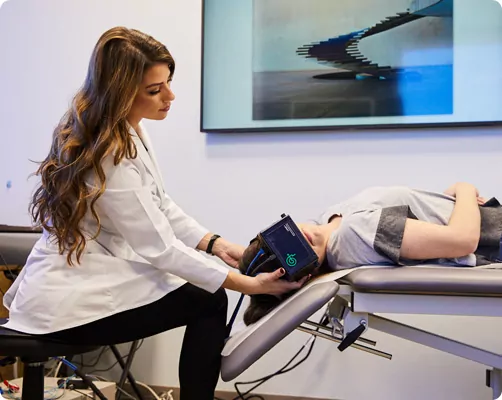Is Medication Correct for Your Vertigo? Listed here is What Specialists Say
Is Medication Correct for Your Vertigo? Listed here is What Specialists Say
Blog Article
Vertigo is just a common problem that influences millions of people worldwide. It's characterized with a feeling of dizziness, spinning, or emotion off-balance. While vertigo may be brought on by various facets, identifying the underlying cause is a must in deciding the utmost effective therapy plan. In that post, we shall discuss why it is important to identify the causes of vertigo successful treatment and how it may increase your general quality of life.

Vertigo could be caused by many facets such as for instance inner hearing problems, mind injuries, migraines, and actually specific medications. Without understanding the root cause of your vertigo signs, it could be challenging to get a proper therapy which will provide long-term relief. For example, if your vertigo is brought on by an internal hearing issue but you're recommended medicine for headaches alternatively, you might not knowledge any development in your symptoms.
Pinpointing the reason for vertigo takes a thorough evaluation from the medical professional. This could include physical exams and diagnostic tests such as for example body function and imaging runs to rule out any underlying problems or injuries that might be creating your symptoms. Once the cause has been identified, a personalized treatment strategy may be made to handle your specific needs.
One reasons why identifying the cause of vertigo is crucial for successful treatment is basically because different causes involve different methods in controlling symptoms. For instance, if your vertigo is a result of an internal head problem named benign paroxysmal positional vertigo (BPPV), unique exercises called canalith rethinking maneuvers may help reduce symptoms. But, these exercises wouldn't be beneficial if your vertigo was brought on by something else like vestibular neuritis.
More over, treating just the outward symptoms without addressing their root cause may lead to short-term relief although not long-term development in overall health and well-being. For example, using treatment to ease vertigo symptoms due to an internal ear problem may give short-term reduction, but it does not handle the main issue. This will lead to continuing episodes of vertigo and a lowered quality of life.
Distinguishing the reason for vertigo is also vital in avoiding future attacks and controlling any possible complications. Like, if your vertigo is the result of a head damage, distinguishing it in early stages may prevent further injury and permit appropriate treatment to be administered promptly.

Realization: In summary, determining the explanation for your vertigo is needed for effective treatment and overall well-being. It makes for a individualized method that handles the root trigger somewhat than just managing symptoms. With appropriate analysis and therapy, you are able to knowledge long-term respite from your indicators and boost your quality of life significantly. If you should be encountering repeated symptoms of vertigo or other connected symptoms, do not hesitate to get medical attention to find out the main trigger and obtain suitable treatment.
________________________________________
Understanding the Area Effects of Frequent Vertigo Medications
===============================================
Vertigo is really a popular condition that affects millions of people worldwide. It's indicated with a feeling of dizziness, rotating, and lack of balance. While there are numerous triggers for vertigo, it could be debilitating and significantly influence one's quality of life. Luckily, you will find medications accessible to greatly help reduce the observable symptoms and give reduction for those experiencing vertigo. In that post, we will examine the different types of medication for vertigo reduction and why they work.

Probably the most typically prescribed treatment for vertigo is named Meclizine (Antivert). This medicine goes to a type called antihistamines which function by blocking histamine receptors in the brain responsible for causing dizziness and nausea. Meclizine has been found to work in lowering signs such as dizziness, nausea, and nausea related to vertigo. It's usually taken 1-4 instances day-to-day with regards to the seriousness of symptoms.
Another kind of treatment used to treat vertigo is called Benzodiazepines (Valium or Ativan). These medications act on certain neurotransmitters in mental performance that control harmony and coordination. They have been found to work in lowering emotions of dizziness and anxiety associated with vertigo. But, these drugs may cause drowsiness
as a side effect therefore they must be combined with caution.
In some cases wherever different medications haven't provided aid or if you will find main problems creating vertigo such as Meniere's infection or vestibular headaches, doctors might prescribe diuretics like hydrochlorothiazide (HCTZ) or acetazolamide (Diamox). These drugs perform by lowering fluid accumulation in the inner hearing that may contribute to episodes of vertigo.
For individuals who experience serious bouts of vertigo that not answer effectively to different medications, health practitioners may possibly prescribe steroids such as prednisone. These drugs work by lowering inflammation in the inner hearing that may cause vertigo. However, they're frequently given for short-term use because of potential area effects.
Along with these drugs, health practitioners could also recommend vestibular rehabilitation therapy (VRT) for long-term relief from vertigo symptoms. VRT is an application of physical therapy that centers around workouts and methods to boost stability and lower dizziness. It's been found to be effective in managing vertigo indicators and improving overall quality of life.

Conclusion: While there is no one-size-fits-all strategy as it pertains to managing vertigo, medicines can offer substantial relief for anyone struggling with this condition. Meclizine, Benzodiazepines, diuretics, steroids, and VRT are generally prescribed possibilities which were discovered to be effective in handling vertigo symptoms. It is very important to consult with a physician before starting any medicine regimen as they can determine the most effective span of treatment predicated on personal wants and medical history. Report this page